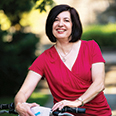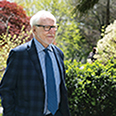By Carol Brevart-Demm

Arthur Chu stands behind the Jeopardy! contestants’ desk, his expression deadpan, pounding furiously on the buzzer in his hand, answering correctly question upon question. Reputedly a man of few words, here he knows just how to “chu”se the right ones to keep himself on the show.
Typically moving slowly into action for the first few minutes of a game, he revs up toward the end of the first round, pushes down on his intellectual accelerator, and morphs into a general-knowledge behemoth on a rampage. Sometimes he even interrupts show host Alex Trebek, so anxious is he to pounce on the next question, leaving his competitors standing helpless, watching in awe, their buzzers mute, as he devours question after question.
By Amy Stone ’64
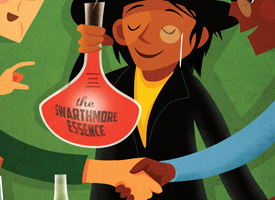
With colleges and universities under mounting pressure to produce quickly employable grads, one wonders whether the model of the small liberal arts college—which advocates seminar-style teaching and espouses values of respect, tolerance, and living simply—is transferable.
Related Articles
By Carrie Compton

The marriage equality movement in America is turning a corner. Equal rights that allow same-sex partners to wed have presidential endorsement, support from a majority of Americans, and even have elicited a surprisingly laissez-faire attitude from Pope Francis. The movement is gaining so much momentum that statistics and facts are outdated almost before appearing in print. LGBT couples now find themselves at that gray intersection in history’s crossroads, where loopholes abound and the rules shift state by state.
Related Article

Family legend has it that when my grandfather Dick Smith ’41 was a junior at Swarthmore, his father sat him down for a serious talk. “Son,” said Claude, Class of 1914, “it is time to get thee a wife. I found thy mother (Mary Roberts Smith, Class of 1914) at Swarthmore, and that is where thee should find thy wife as well.” So Dick paid close attention to the entering class, setting his heart on the bright and beautiful June Corey.
Related Article
By Paul Wachter ’97

With 3 million residents, Minneapolis–St. Paul has the 15th largest metro area in the United States—bigger than Pittsburgh’s but smaller than Philadelphia’s. Like all metropolises, the Twin Cities have their own histories. But they also share a larger urban history of the country, a history that for most of the last century was defined by the automobile-led push from city centers into the suburbs.
By Rebecca Chopp

Swarthmore College has always been committed to understanding and affirming its traditions, and this year a sesquicentennial celebration presents a fresh opportunity to reflect on how the College has changed throughout its 150 years and how it has stayed the same.

Ben Franklin, who knew something about writing, editing, and publishing, quipped in his Autobiographyt hat God was a loving proofreader who forgave and corrected the “errata” of our lives. A similar sense of wry understanding marks Daniel Menaker ’63’s recently published memoir My Mistake. Menaker worked for 26 years at “the brilliant crazy house called The New Yorker,” climbing his way up from fact-checker to copy editor to one of the people responsible for the stellar array of fiction and nonfiction the magazine published in the 1970s and 1980s.
By Stannard Baker ’68
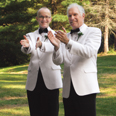
When my husband Peter Harrigan and I were plaintiffs in the 1997 Vermont Freedom to Marry lawsuit, press asked us: Why did you decide to do this? Our answer: Because we fell in love. After four years together, we wanted to have a legal bond joining us, and we wanted to be able to proclaim our love in front of our family and friends. Marriage is a core institution of our society, and being barred from it is akin to losing the right to vote. If anyone is excluded from a right that others have, then no one’s rights are safe.
 Arthur Chu stands behind the Jeopardy! contestants’ desk, his expression deadpan, pounding furiously on the buzzer in his hand, answering correctly question upon question. Reputedly a man of few words, here he knows just how to “chu”se the right ones to keep himself on the show.
Typically moving slowly into action for the first few minutes of a game, he revs up toward the end of the first round, pushes down on his intellectual accelerator, and morphs into a general-knowledge behemoth on a rampage. Sometimes he even interrupts show host Alex Trebek, so anxious is he to pounce on the next question, leaving his competitors standing helpless, watching in awe, their buzzers mute, as he devours question after question.
Arthur Chu stands behind the Jeopardy! contestants’ desk, his expression deadpan, pounding furiously on the buzzer in his hand, answering correctly question upon question. Reputedly a man of few words, here he knows just how to “chu”se the right ones to keep himself on the show.
Typically moving slowly into action for the first few minutes of a game, he revs up toward the end of the first round, pushes down on his intellectual accelerator, and morphs into a general-knowledge behemoth on a rampage. Sometimes he even interrupts show host Alex Trebek, so anxious is he to pounce on the next question, leaving his competitors standing helpless, watching in awe, their buzzers mute, as he devours question after question.  With colleges and universities under mounting pressure to produce quickly employable grads, one wonders whether the model of the small liberal arts college—which advocates seminar-style teaching and espouses values of respect, tolerance, and living simply—is transferable.
With colleges and universities under mounting pressure to produce quickly employable grads, one wonders whether the model of the small liberal arts college—which advocates seminar-style teaching and espouses values of respect, tolerance, and living simply—is transferable.
 The marriage equality movement in America is turning a corner. Equal rights that allow same-sex partners to wed have presidential endorsement, support from a majority of Americans, and even have elicited a surprisingly laissez-faire attitude from Pope Francis. The movement is gaining so much momentum that statistics and facts are outdated almost before appearing in print. LGBT couples now find themselves at that gray intersection in history’s crossroads, where loopholes abound and the rules shift state by state.
The marriage equality movement in America is turning a corner. Equal rights that allow same-sex partners to wed have presidential endorsement, support from a majority of Americans, and even have elicited a surprisingly laissez-faire attitude from Pope Francis. The movement is gaining so much momentum that statistics and facts are outdated almost before appearing in print. LGBT couples now find themselves at that gray intersection in history’s crossroads, where loopholes abound and the rules shift state by state.  Family legend has it that when my grandfather Dick Smith ’41 was a junior at Swarthmore, his father sat him down for a serious talk. “Son,” said Claude, Class of 1914, “it is time to get thee a wife. I found thy mother (Mary Roberts Smith, Class of 1914) at Swarthmore, and that is where thee should find thy wife as well.” So Dick paid close attention to the entering class, setting his heart on the bright and beautiful June Corey.
Family legend has it that when my grandfather Dick Smith ’41 was a junior at Swarthmore, his father sat him down for a serious talk. “Son,” said Claude, Class of 1914, “it is time to get thee a wife. I found thy mother (Mary Roberts Smith, Class of 1914) at Swarthmore, and that is where thee should find thy wife as well.” So Dick paid close attention to the entering class, setting his heart on the bright and beautiful June Corey.  With 3 million residents, Minneapolis–St. Paul has the 15th largest metro area in the United States—bigger than Pittsburgh’s but smaller than Philadelphia’s. Like all metropolises, the Twin Cities have their own histories. But they also share a larger urban history of the country, a history that for most of the last century was defined by the automobile-led push from city centers into the suburbs.
With 3 million residents, Minneapolis–St. Paul has the 15th largest metro area in the United States—bigger than Pittsburgh’s but smaller than Philadelphia’s. Like all metropolises, the Twin Cities have their own histories. But they also share a larger urban history of the country, a history that for most of the last century was defined by the automobile-led push from city centers into the suburbs.
 Swarthmore College has always been committed to understanding and affirming its traditions, and this year a sesquicentennial celebration presents a fresh opportunity to reflect on how the College has changed throughout its 150 years and how it has stayed the same.
Swarthmore College has always been committed to understanding and affirming its traditions, and this year a sesquicentennial celebration presents a fresh opportunity to reflect on how the College has changed throughout its 150 years and how it has stayed the same.
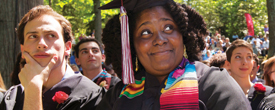

 Ben Franklin, who knew something about writing, editing, and publishing, quipped in his Autobiographyt hat God was a loving proofreader who forgave and corrected the “errata” of our lives. A similar sense of wry understanding marks Daniel Menaker ’63’s recently published memoir My Mistake. Menaker worked for 26 years at “the brilliant crazy house called The New Yorker,” climbing his way up from fact-checker to copy editor to one of the people responsible for the stellar array of fiction and nonfiction the magazine published in the 1970s and 1980s.
Ben Franklin, who knew something about writing, editing, and publishing, quipped in his Autobiographyt hat God was a loving proofreader who forgave and corrected the “errata” of our lives. A similar sense of wry understanding marks Daniel Menaker ’63’s recently published memoir My Mistake. Menaker worked for 26 years at “the brilliant crazy house called The New Yorker,” climbing his way up from fact-checker to copy editor to one of the people responsible for the stellar array of fiction and nonfiction the magazine published in the 1970s and 1980s.
 When my husband Peter Harrigan and I were plaintiffs in the 1997 Vermont Freedom to Marry lawsuit, press asked us: Why did you decide to do this? Our answer: Because we fell in love. After four years together, we wanted to have a legal bond joining us, and we wanted to be able to proclaim our love in front of our family and friends. Marriage is a core institution of our society, and being barred from it is akin to losing the right to vote. If anyone is excluded from a right that others have, then no one’s rights are safe.
When my husband Peter Harrigan and I were plaintiffs in the 1997 Vermont Freedom to Marry lawsuit, press asked us: Why did you decide to do this? Our answer: Because we fell in love. After four years together, we wanted to have a legal bond joining us, and we wanted to be able to proclaim our love in front of our family and friends. Marriage is a core institution of our society, and being barred from it is akin to losing the right to vote. If anyone is excluded from a right that others have, then no one’s rights are safe.


